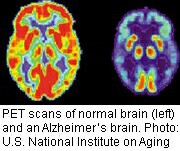Could offer possible ways to diagnose, treat disease sooner, researchers say
THURSDAY, June 11, 2015 (HealthDay News) — Lysosomal proteins may offer a way to diagnose and treat Alzheimer’s disease earlier, a new study suggests. The findings were published online June 10 in Neurology.
Edward Goetzl, M.D., professor of medicine with the University of California, San Francisco, and a researcher at the U.S. National Institute on Aging, and colleagues analyzed blood samples taken from 20 people who later went on to develop Alzheimer’s disease. The blood samples were taken up to 10 years before the people were diagnosed with the disease, the researchers said. They also looked at blood samples from people who already had Alzheimer’s disease (26 patients) and people with frontotemporal dementia (16 patients). Then they compared these samples to blood samples from 46 cognitively normal adults.
The researchers discovered that exosomal levels of autolysosomal proteins were significantly different for the healthy controls than for those with dementia — both one to 10 years before and at diagnosis of Alzheimer’s disease (P ≤ 0.0003).
“The results also show us that there are major abnormalities in how these proteins function in brain cells, which could potentially provide a new target for treatments,” Goetzl said in a journal news release. Goetzl is also a scientist at NanoSomiX Inc., a California-based biotechnology company that provided funding for the study. “These results may help improve our understanding of how lysosomes function in Alzheimer’s disease and may help us understand how the brain responds to the developing disease,” he said.
Copyright © 2015 HealthDay. All rights reserved.








